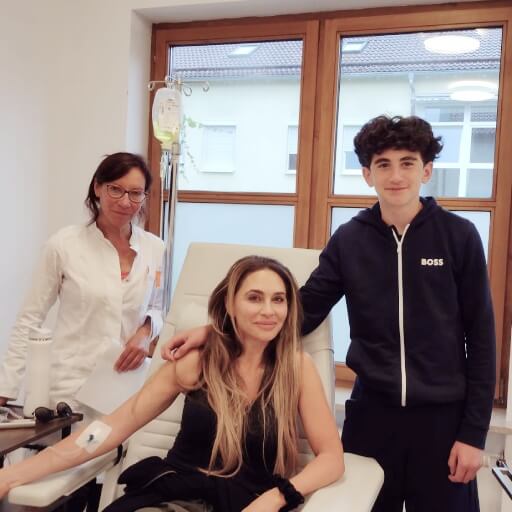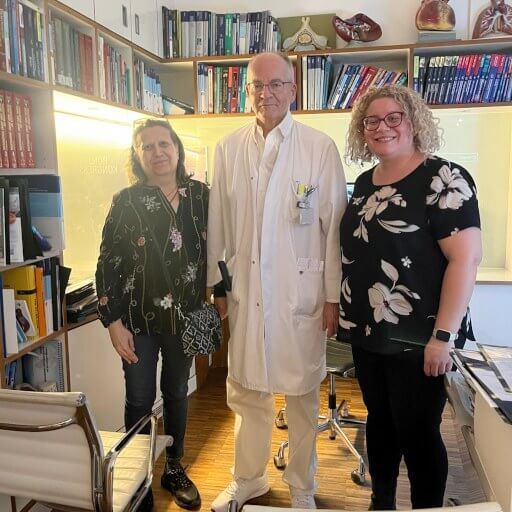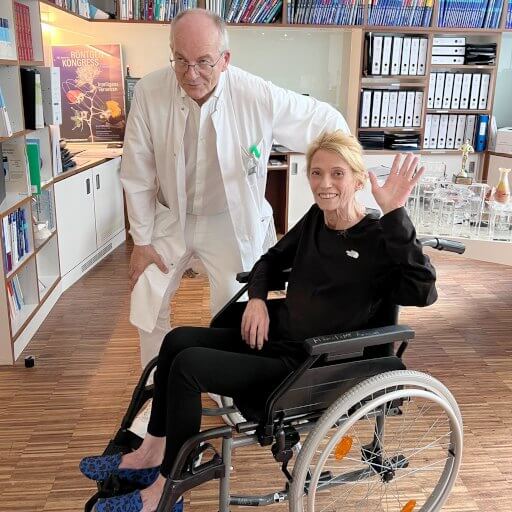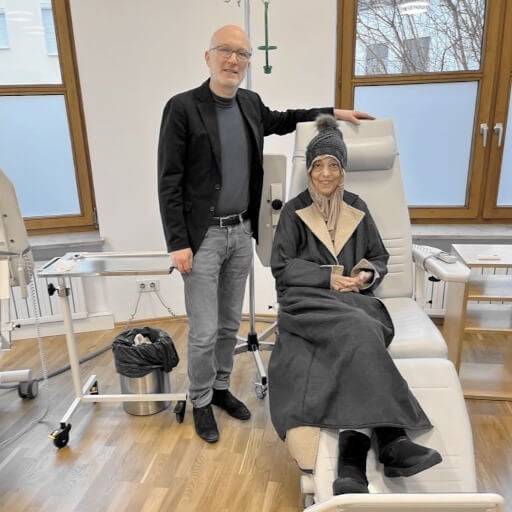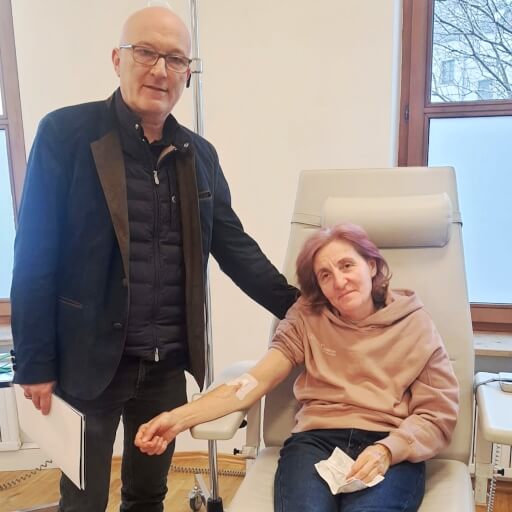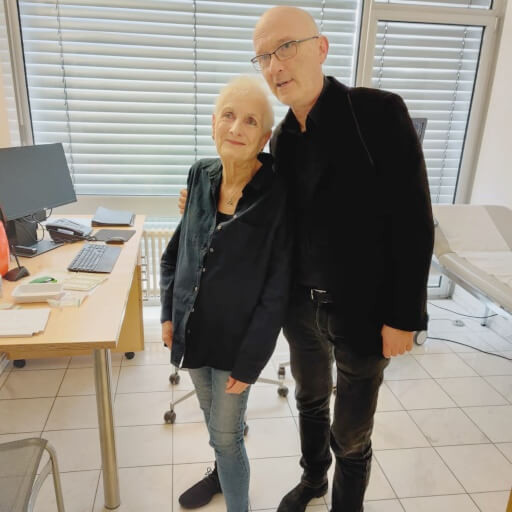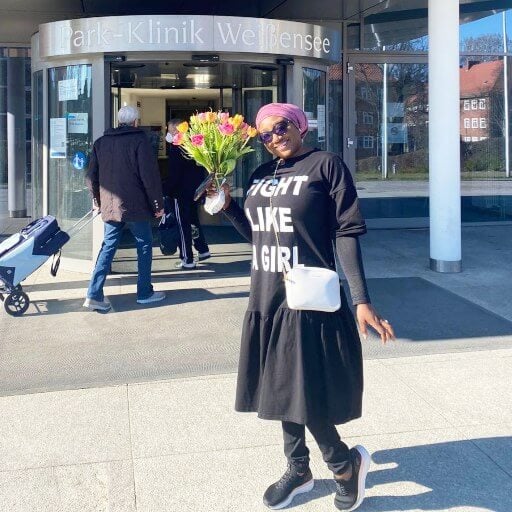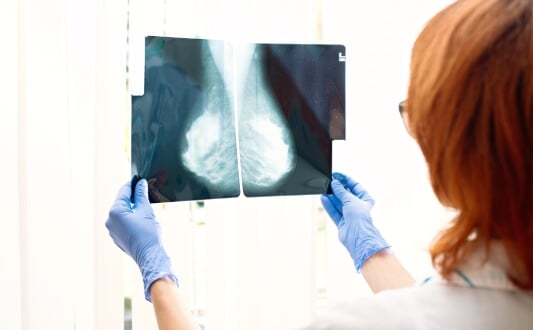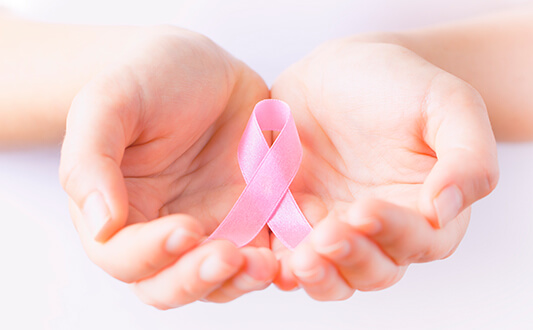Breast cancer is a disease that can lead to fatality. However, it can be fatal only if it has not been treated on time. In recent years, doctors have learned how to manage this pathology effectively. As a result, there is now a high survival rate among patients, especially in developed countries. Many effective methods of breast cancer treatment have been developed over the years: surgeries, chemotherapy, radiotherapy, and hormone therapy, as reported by the American Cancer Society [1].
Modern treatment options also include advanced immunotherapy approaches, particularly dendritic cell vaccines – a discovery by Ralph Steinman that earned the 2011 Nobel Prize in Medicine. These vaccines utilize the patient's own immune system to recognize and destroy cancer cells, offering personalized treatment with minimal side effects. Clinical data suggest that when dendritic cell therapy is added to standard treatment, survival rates may increase even in advanced stages of the disease, such as breast cancer stage 4. [2]
Let us discuss what is most important about breast cancer for women: what to do after the diagnosis is established and what are the chances of curing breast cancer – especially when seeking innovative options like breast cancer treatment in Germany or abroad.
Breast Cancer – What To Do?
Breast cancer does not have to be a sentence. In most cases, the disease is well-treatable. In stages 1-2, it can be cured completely. Even in the 3rd stage, doctors manage to prolong the life of patients for many years [1]. There are many stories where women with a late diagnosis of breast cancer lived for decades after receiving quality treatment.
Nowadays, in developed countries, even if breast cancer is detected at stage 3, only about 13-14% of patients die within the first 5 years after diagnosis [3]. However, the majority live much longer, especially those who receive modern, personalized care.
Do not assume that if you have breast cancer, it is the end of the world. The main thing is to not hesitate and see a doctor. Here is the worst thing you can do:
- Not consult a doctor after detecting breast cancer symptoms. If there is discharge from the nipple, the mammary gland has deformed, or there are ulcerations, it is obvious that you need to go to the doctor as soon as possible [1]. However, some women "hide their heads in the sand." They do not consult the doctor for fear of hearing bad news. This only causes the disease to progress. As a result, breast cancer is found at a later stage, and the effectiveness of its treatment is reduced.
- To use folk methods as treatment for breast cancer. Some women have been misguided by unreliable sources and start using herbs or turn to alternative healers. This can last for years. Naturally, the "treatment" does not work. The disease continues to develop, metastasizes, and eventually reaches a stage where it is no longer curable.
If you want to say after several years: "I defeated the breast cancer," you need to start treatment today and not hide from medical reality. If your country has a low level of medical care and development, you can go abroad – for example, to Germany, which provides access to breast cancer treatment that is highly effective even in advanced forms of cancer.
Of course, it would be unrealistic to believe that stage 4 breast cancer is fully curable. It is not possible to completely eliminate the disease at this point. However, with modern therapies – including targeted therapy, immunotherapy, and dendritic cell vaccination – it is very possible to prolong life by 3-5 years, and in some cases, even longer [2]. Innovative treatments now offer improved outcomes and better quality of life for patients.
Is Breast Cancer Treatable?
Breast cancer is curable, especially in the early stages. Medical clinics of developed countries, such as Germany and the USA, have achieved much greater success in the treatment of breast cancer. Europe, in particular, demonstrates better survival rates compared to developing countries, largely due to access to advanced technologies, personalized care, and innovative treatment methods.
Whether breast cancer can be cured depends primarily on the stage at which the disease was detected. To estimate the prognosis, such an indicator as the relative five-year survival rate is used. These statistics show the likelihood of surviving breast cancer for five years after diagnosis, compared to people without the disease [3]. However, this metric does not account for death from other causes. For example, if a survival rate is listed as 100%, it means none of the patients died from breast cancer specifically – though some may have passed away due to unrelated reasons.
Below is the breast cancer prognosis by stage, based on statistics from developed countries [4]:
- Stage 1 – 98%-100%
- Stage 2 – 90%-99%
- Stage 3 – 66%-98%
- Stage 4 – 22%-33% (standard treatment)/up to 60% with innovative therapy
These numbers, however, only provide an approximate idea of the disease's severity and the medical progress achieved in recent years. In fact, current survival rates are believed to be even higher, especially with the use of targeted therapy, hormone therapy, and dendritic cell vaccination – a personalized form of immunotherapy now widely available in Germany. It is important to note that the data mentioned above mostly reflects patients treated between 2015 and 2021, and over the past few years, treatment protocols have evolved significantly. Therefore, patients beginning treatment today are likely to experience substantially improved outcomes.
Patients diagnosed in the early stages often ask whether it is possible to cure breast cancer completely. The answer is yes – particularly in stages 1 and 2. For patients diagnosed at advanced stages, especially breast cancer stage 4, the main concern becomes life expectancy. Many seek exact figures like "1 year and 3 months," hoping for clarity.
Naturally, no doctor can provide an exact timeline. The five-year survival rate by stage offers a general framework, but many additional factors influence each patient's prognosis. For example, sub-stages are not reflected in this data. A patient with stage 2A has a better outlook than one with stage 2B, even though both fall under stage 2 [3, 4].
Furthermore, the prognosis is influenced by the following [2, 3]:
- Molecular type of cancer (e.g., HER2-positive, triple-negative, luminal A/B), which determines tumor behavior and response to treatment
- Age of the patient, which affects immune system function and treatment tolerance
- Tumor location, which can impact how soon it spreads to lymph nodes or distant organs
- Country of residence, which determines access to specialized care and advanced therapies
How long people live with breast cancer is an individual matter. Doctors can provide a prognosis or a survival estimate, often expressed in percentiles. However, reality can differ widely from statistical averages. For example, life expectancy with stage 4 breast cancer in Germany may range from 1 year to 7-8 years or more, especially if the patient undergoes modern treatment, including dendritic cell therapy.
Survival in breast cancer strongly depends on the quality and timeliness of treatment. Below are general survival statistics across all stages for patients who receive appropriate care [5-7]:
- 5-year survival rate – 89%
- 10-year survival rate – 82%-86%
- 15-year survival rate – 75%-77%
As we can see, most women manage to overcome breast cancer completely. If the disease does not recur within 15 years, it is generally considered cured. On the other hand, if the patient does not receive timely treatment, the outcome is grim. The five-year survival rate in such cases drops to just 15%-17%. Clinical research further confirms that survival rates are highly dependent on tumor subtype, genetic mutations, and the individual characteristics of the patient.
Breast Implantation After Breast Cancer
For a woman, breast cancer is not only a threat to life, but also a challenge to body image and emotional well-being. In some cases, a radical mastectomy is performed – this involves complete removal of the mammary gland [8]. After breast cancer surgery, rehabilitation can be long and emotionally difficult, as the loss of a breast often causes psychological distress and reduced self-esteem.
However, in developed countries, doctors increasingly perform breast-conserving surgeries, where only part of the breast is removed [8]. This is usually possible in the early stages of the disease and allows for natural breast reconstruction using the patient's own tissues.
In recent years, oncoplastic surgery has gained popularity. This modern approach combines tumor removal with cosmetic reconstruction during the same operation, allowing the surgeon to preserve the breast's shape and symmetry, often avoiding future corrective surgeries. [8]
If the entire mammary gland must be removed, women still have excellent reconstruction options. Breast implants are widely used, and autologous tissue reconstruction is also possible. In this case, the surgeon takes fat tissue from the patient's abdomen (for example, using the DIEP flap method) and reshapes it into a new breast. In some cases, implants may be used in combination with natural tissue to restore larger breast volume.
These advanced procedures significantly improve quality of life and self-confidence after cancer treatment, especially when performed at leading clinics in Germany, where patients benefit from experienced reconstructive surgeons and personalized care.
| Stage | Surgery Alone | Chemotherapy | Hormonal Therapy | DC Vaccination + Standard Treatment |
|---|---|---|---|---|
| Stage I | 75-80% | 70-75% | 80-85% | up to 99% |
| Stage II | 65-70% | 60-65% | 75-80% | up to 85% |
| Stage III | 45-50% | 40-45% | 55-60% | up to 75% |
| Stage IV | 10-15% | 15-20% | 20-25% | up to 60% |
* Booking Health data. Survival rates vary widely depending on the molecular type of cancer, the patient's health status, stage at diagnosis, and access to innovative treatments.
Patient Story: Beating Advanced Breast Cancer with Dendritic Cell Therapy
While breast cancer can be devastating, modern medicine offers hope even in advanced cases. Though overall survival varies significantly by stage, Magdalena Ivanova's story proves that innovative treatments can make a difference when traditional methods fall short.
After initially battling breast cancer with surgery, radiation, and chemotherapy in Bulgaria, Magdalena faced a recurrence years later. The cancer had progressed to stage 4 with bone metastases. Having experienced the harsh side effects of conventional treatments, she knew she needed a different approach.
Her search led her to Germany, where she discovered dendritic cell therapy – an innovative form of immunotherapy that offers several key advantages. Unlike standard treatments, this approach is 100% personalized, using the patient's own immune cells to create a targeted vaccine. The process involves collecting blood, isolating dendritic cells, and engineering them to recognize and attack cancer cells specifically. This precise targeting means minimal impact on healthy tissues and virtually no side effects.
Magdalena's experience confirms these benefits: "The treatment process itself was quite simple and not strenuous at all," she shares. "I could eat whatever I wanted, move freely, and perform all daily activities." The therapy required no physical preparation, and she maintained her daily routine throughout the treatment period.
The success of her treatment exceeded expectations, demonstrating the potential of dendritic cell vaccination even in cases of advanced breast cancer. While conventional treatments often fail to improve survival rates in stage 4 disease, her story shows that personalized immunotherapy can provide effective results while preserving quality of life. This is especially significant for patients who have experienced debilitating side effects from traditional therapies or are actively seeking gentler alternatives for late-stage cancer.
"No Side Effects": Bulgarian Patient Magdalena Ivanova on Dendritic Cell Therapy
Which Hospitals of Germany Provide Treatment for Breast Cancer?
Medical data reveals that the chances of survival in breast cancer improve dramatically when patients have access to comprehensive treatment facilities and innovative therapies. The highest success rates in breast cancer treatment are demonstrated by several leading oncological hospitals in Germany, which offer multidisciplinary approaches and access to advanced therapies, including immunotherapy and dendritic cell vaccines.
Some of the reputable hospitals providing breast cancer treatment in Germany include:
- University Hospital LMU Munich, Department of Gynecology and Obstetrics – Munich, Bavaria
- Hannover Medical School (MHH), Department of Gynecology and Mammology – Hannover, Lower Saxony
- University Hospital Greifswald, Department of Gynecology – Greifswald, Mecklenburg-Western Pomerania
- Dr. Ute Sendler Clinic, Gynecologic Oncology Unit – Munich, Bavaria
- LDG Laboratories Dr. Gansauge, Specialized Oncology Diagnostics – Berg, Bavaria
- University Hospital Jena, Department of Gynecology and Reproductive Medicine – Jena, Thuringia
- University Hospital Marburg UKGM, Breast Cancer Center – Marburg, Hesse
- University Hospital Essen, Comprehensive Cancer Center – Essen, North Rhine-Westphalia
- University Hospital RWTH Aachen, Department of Gynecology and Oncology – Aachen, North Rhine-Westphalia
- University Hospital Halle (Saale), Department of Gynecology and Mammology – Halle (Saale), Saxony-Anhalt
The cost of the medical program depends on the complexity of the case, required diagnostic tests, chosen treatment methods, the hospital, and the attending physician. The presence of concomitant diseases may also influence the final cost. Below is the average cost of treatment in specialized breast cancer centers in Germany:
- Diagnostic of Breast Cancer – 4,540 EUR
- Sectoral resection with flap reconstruction – 13,640 EUR
- Radical mastectomy with removing fascia of the pectoralis major or minor – 14,560 EUR
- Chemotherapy for stage 4 breast cancer – 8,440 EUR
- Radiation therapy for breast cancer – 22,680 EUR
- Proton therapy for breast cancer – 85,920 EUR
- Breast reconstruction after mastectomy with own tissues or implant – 18,970 EUR
- Breast reconstruction after tumor removal with an expander or alloprosthesis – 14,370 EUR
- Plastic reconstruction of the breast with own tissues using the DIEP flap method – 45,260 EUR
- Dendritic cell vaccination for breast cancer – 20,000 - 38,000 EUR
- Oncological Rehabilitation – 1,800 EUR per day
Studies consistently show that the survival rate of breast cancer increases substantially when traditional treatments are combined with modern approaches such as targeted therapy, hormonal therapy, and immunotherapy. Recent research demonstrates that the percentage of survival has improved significantly over the past decades due to advancements in personalized treatment and especially the usage of dendritic cell vaccines in clinics across Germany.
Fighting Breast Cancer Together: Treatment Journeys with Booking Health
A Medical Journey: Every Step of the Way With Booking Health
Finding the best treatment strategy for your clinical situation can be overwhelming. Exhausted from multiple treatment sessions, discouraged by conflicting opinions, or burdened by the limitations of standard protocols with long lists of side effects – many patients find themselves at a crossroads.
In such moments, it is essential to make an informed choice. Booking Health helps you access personalized cancer treatment based on the latest medical innovations, tailored specifically to your condition. With over 12 years of experience, we specialize in organizing complex treatment programs in Germany for patients from all over the world.
Our services include:
- Assessment and analysis of medical reports
- Development of an individualized treatment plan
- Selection of the best clinic based on your diagnosis
- Translation and preparation of medical documents
- Communication with German clinicians before arrival
- Support throughout the hospital stay and follow-up care
- Visa assistance and flight booking
- Ground transportation from airport to clinic
- A dedicated coordinator and interpreter available 24/7
- Transparent budgeting with no hidden costs
As a certified medical tourism provider, Booking Health also offers:
- Direct contracts with top German hospitals, which allow faster access to treatment
- The ability to save up to 70% on treatment due to the absence of intermediary surcharges
- A guaranteed fixed price – even if complications arise
- Medical insurance coverage of up to €200,000, valid during treatment and for four years after
Health is our most valuable asset. Entrust your treatment to Booking Health. We are here to help you access the best possible care, offering hope through advanced therapies and compassionate guidance.
Contact our medical consultant today to explore personalized treatment options for breast cancer – including the most innovative therapies for even stage 4 disease – in collaboration with leading German specialists.
Frequently Asked Questions of Our Patients with Breast Cancer
Send request for treatmentThe five-year relative survival rate is 89% for all stages combined, increasing to 98-100% for early-stage breast cancer. The rate decreases to around 22% for stage 4 breast cancer.
Key factors include cancer stage at diagnosis, molecular type of cancer, and access to quality healthcare. Age, tumor location, and response to treatment also significantly impact survival outcomes.
Early detection dramatically improves outcomes, with stage 1 breast cancer having nearly 100% five-year survival rate. Detection before metastasis offers the best chance for successful treatment and full recovery.
Are survival rates different for specific types of breast cancer, such as triple-negative or inflammatory breast cancer?
Different types have varying prognoses – triple-negative breast cancer typically has lower survival rates than hormone-receptor-positive cancers. Inflammatory breast cancer tends to have more aggressive progression and lower survival rates.
Survival rates have improved significantly due to advances in treatment, like development of dendritic cell vaccination, and earlier detection. The overall five-year survival rate has increased from about 75% in the 1970s to 89% today.
Regular exercise and maintaining a healthy weight can improve survival rates by up to 30%. Following recommended treatment plans and avoiding alcohol also positively impact survival outcomes.
Choose treatment abroad and you will be sure to get the best results!
Authors:
This article was edited by medical experts, board-certified doctors Dr. Nadezhda Ivanisova, and Dr. Bohdan Mykhalniuk. For the treatment of the conditions referred to in the article, you must consult a doctor; the information in the article is not intended for self-medication!
Our editorial policy, which details our commitment to accuracy and transparency, is available here. Click this link to review our policies.
Sources:
[1] American Cancer Society. Treating Breast Cancer. https://www.cancer.org/cancer/types/breast-cancer/treatment.html
[2] Biomedicine & Pharmacotherapy. Dendritic Cell Vaccines in Breast Cancer: Immune Modulation and Immunotherapy. https://www.sciencedirect.com/science/article/pii/S0753332223004730
[3] American Cancer Society. Survival Rates for Breast Cancer. https://www.cancer.org/cancer/types/breast-cancer/understanding-a-breast-cancer-diagnosis/breast-cancer-survival-rates.html
[4] Susan G. Komen. Understanding Breast Cancer Survival Rates. https://www.komen.org/breast-cancer/facts-statistics/breast-cancer-statistics/survival-rates/
[5] Canadian Cancer Society. Survival Statistics for Breast Cancer. https://cancer.ca/en/cancer-information/cancer-types/breast/prognosis-and-survival/survival-statistics
[6] CA: A Cancer Journal for Clinicians. Breast Cancer Statistics 2024. https://acsjournals.onlinelibrary.wiley.com/doi/10.3322/caac.21863
[7] Irish Journal of Medical Science. Beyond a Decade: A Comparative Study of 15-Year Survival Rates in Screen-Detected vs. Symptomatic Breast Cancer Patients in Hungary. https://link.springer.com/article/10.1007/s11845-023-03463-x
[8] Gland Surgery. Oncoplastic Breast-Conserving Surgery: Advancing Oncological Outcomes and Aesthetic Standards in Breast Cancer Treatment. https://gs.amegroups.org/article/view/137394/html
Read:
Breast cancer treatment with dendritic cells in Germany
Immunotherapy for breast cancer in Germany
Comprehensive Guide to Stage 4 Breast Cancer: Treatment Options
Article menu:
- Breast Cancer – What To Do?
- Is Breast Cancer Treatable?
- Breast Implantation After Breast Cancer
- Patient Story: Beating Advanced Breast Cancer with Dendritic Cell Therapy
- Which Hospitals of Germany Provide Treatment for Breast Cancer?
- A Medical Journey: Every Step of the Way With Booking Health
- Frequently Asked Questions of Our Patients with Breast Cancer
Don't know where to start?
Contact Booking Health
